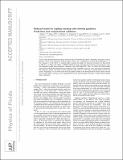Reduced model for capillary breakup with thermal gradients: Predictions and computational validation
Author(s)
Shukla, I.; Wang, F.; Mowlavi, S.; Guyomard, A.; Liang, X.; Johnson, S. G.; Nave, J.-C.; ... Show more Show less
DownloadPOF21-AR-04653.pdf (607.6Kb)
Open Access Policy
Open Access Policy
Creative Commons Attribution-Noncommercial-Share Alike
Terms of use
Metadata
Show full item recordAbstract
It was recently demonstrated that feeding a silicon-in-silica coaxial fiber into a flame—imparting a steep silica viscosity gradient—results in the formation of silicon spheres whose size is controlled by the feed speed [Gumennik et al., “Silicon-in-silica spheres via axial thermal gradient in-fiber capillary instabilities,” Nat. Commun. 4, 2216 (2013)]. A reduced model to predict the droplet size from the feed speed was then derived by Mowlavi et al. [“Particle size selection in capillary instability of locally heated coaxial fiber,” Phys. Rev. Fluids 4, 064003 (2019)], but large experimental uncertainties in the parameter values and temperature profile made quantitative validation of the model impossible. Here, we validate the reduced model against fully resolved three-dimensional axisymmetric Stokes simulations using the exact same physical parameters and temperature profile. We obtain excellent quantitative agreement for a wide range of experimentally relevant feed speeds. Surprisingly, we also observe that the local capillary number at the breakup location remains almost constant across all feed speeds. Owing to its low computational cost, the reduced model is therefore a useful tool for designing future experiments.
Date issued
2021-12Department
Massachusetts Institute of Technology. Department of Mathematics; Massachusetts Institute of Technology. Department of Mechanical EngineeringJournal
Physics of Fluids
Publisher
AIP Publishing
Citation
Shukla, I., Wang, F., Mowlavi, S., Guyomard, A., Liang, X. et al. 2021. "Reduced model for capillary breakup with thermal gradients: Predictions and computational validation." Physics of Fluids, 33 (12).
Version: Author's final manuscript
ISSN
1070-6631
1089-7666
Keywords
Condensed Matter Physics, Fluid Flow and Transfer Processes, Mechanics of Materials, Computational Mechanics, Mechanical Engineering